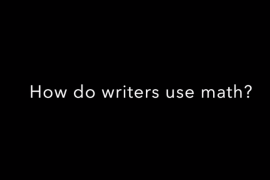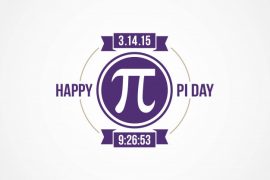Welcome week three of our month devoted to publishing and media. If you haven’t previous posts, what’s stopping you? So far, we’ve looked at book publishing and on-air meteorology (television weatherpersons). This week, it’s time to look at writing. Today you’ll meet Craig Guillot, a freelance writer in New Orleans, who specializes in finance writing, among other things. Craig is the author of Stuff About Money: No BS Financial Advice for Regular People, an ebook, which he says will be available in April. (I’m a source for one section!)
Bottom line? Math helps keep Craig profitable. So if you’re a budding freelance writer–or looking for ways to leave more on your bottom line–listen up.
Can you explain what you do for a living?
I’m a non-fiction freelance writer. My specialties include business, personal finance, retail, real estate, travel and entertainment. I’ve written for publications and web sites, such as Entrepreneur, CNNMoney.com, Washington Post, Nationalgeographic.com and dozens of trade publications. I also have a personal finance book Stuff About Money: No BS Financial Advice for Regular People.
When do you use basic math in your job?
In the actual writing, not much. Just like any other writer or journalist, I interview sources, research, take trips out in the field, gather information and write. I occasionally do a little photography and video too. I do use math on occasion in some of my personal finance work to demonstrate and calculate different things related to retirement and investing.
But I use math a lot in the background. Writing just happens to be my trade. Like any other self-employed person, I am ultimately running a business. As a freelancer I sell my services to editors and corporate clients. I have a lot of regular clients, but I’m constantly taking on new projects and new deals. I need to be able to carefully estimate my time and expenses to give a client an accurate quote.
To me, everything is about the hourly rate. I need to use this as a basis for building my income. And while my overhead isn’t much, I do have to know what’s going out to pay taxes, what’s going into savings, retirement and everything else. It may seem like part of my personal life but I consider it all part of my job. When you’re self employed, you have to constantly think about all of these things.
Do you use any technology (like calculators or computers) to help with this math?
I’m not sure I even have a calculator in my office anymore, but my main tool is Excel. I use it for everything, and I mean everything. It’s a calculator but so much more. There is no problem that can’t be solved, no analysis that can’t be made, in Excel. When you learn how to use it and how to write the formulas you need, you can do anything with it. I use it to analyze my revenues, analyze the profitability of certain assignments. Like everyone else, I use Quickbooks, but I also use Excel for background stuff.
I break everything down to a formula or percentage. This includes my monthly income goals. It doesn’t have to be that way. I don’t imagine it’s that way for many other writers but it works for me and helps me make the optimal decisions. I’ve used Excel to track, analyze and compute things in my regular life as well. I used it in the remodeling of our house, in tracking my net worth, in monitoring my investments, planning retirement, planning trips. I sit down, make up a spreadsheet, build some formulas, input the data and then use it to help make decisions. I run marathons and even use it to track my training runs and races. The more you learn how to use Excel and write formulas, the more uses you find for it.
How do you think math helps you do your job better?
One way it helps me is with analyzing my hourly rate and profitability. Whenever I take on special projects for a corporate client or a custom publisher, I use it to give a quote. I prefer to work on a project rate. I give them a single number but behind that is a lot of math that I have used to arrive at that number. They don’t need to know any of that.
I may also build in a variance. It will let me know if I might be able to live with a cut in that number. So if they want to try to negotiate that down a bit, I know that I can drop by 5%, 7%, 10% or whatever it might be for me to still make what I need to make.
I also need to factor in opportunity cost. That is what else I could be doing with my time. Do I take this project which will tie me up for three weeks or do I decline it and go after smaller but potentially more lucrative projects that will make my time more flexible? I use math to figure all this out.
How comfortable with math do you feel?
In relation to personal finance and business math, I feel very comfortable with it because I use it so much and see the value in it. But all the standard stuff you learn in school? I really don’t remember any of that. I’d have to pull out a book and look up some formulas if you wanted me to calculate cubic volume or something like that.
What kind of math did you take in high school? Did you like it/feel like you were good at it?
Just the basics. Algebra, geometry, standard high school stuff. I wasn’t particularly good at it, I was just average. But I majored in business in college and took a lot of accounting, finance and business math classes. I always excelled at those and had a stronger interest in them. Math dealing with money just felt real to me. There was an instant connection of “Oh, I could actually use this someday.”
Did you have to learn new skills in order to do the math you use in your job? Or was it something that you could pick up using the skills you learned in school?
I did pick up some new skills, but a lot of the business and personal finance math I used today can be traced right back to college. The fact that I actually enjoy this kind of math really helps.
Anything else you want to mention?
Yes. I believe that many of our growing financial problems in this country—like people getting into mortgages they couldn’t afford, our lack of savings, our failure to put enough money away for retirement, our problems with credit card debt—can be traced partly to our failure to use math in our financial lives. People buy homes and cars on emotion but rarely run the numbers. They wouldn’t use debt to overspend if they really knew the long-term consequences. There is a numerical answer for everything in your finances. You have to know why that number is important, how to calculate it and how to use it.
Any questions for Craig? I’m sure he’d be happy to answer them!








Comments are closed.